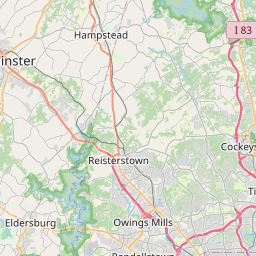Topographic Indices, Baltimore
| Authors: | |
|---|---|
| Owners: | Christa Kelleher |
| Type: | Resource |
| Storage: | The size of this resource is 2.1 GB |
| Created: | Jul 15, 2019 at 4:35 p.m. |
| Last updated: | Oct 23, 2019 at 1:49 p.m. (Metadata update) |
| Published date: | Oct 23, 2019 at 1:49 p.m. |
| DOI: | 10.4211/hs.9afed1aa2aa348fa9c199df30938e9d5 |
| Citation: | See how to cite this resource |
| Content types: | Geographic Raster Content |
| Sharing Status: | Published |
|---|---|
| Views: | 2246 |
| Downloads: | 98 |
| +1 Votes: | 1 other +1 this |
| Comments: | No comments (yet) |
Abstract
Topographic indices calculated in support of Kelleher and McPhillips (in review). We calculated two topographic indices - absolute sink depth (m) and topographic wetness index (-) - using TauDEM (v. 5.3) software and the D-infinity flow routing algorithm.
Watersheds include Gwynns Falls [gwynn] and Jones Falls [jones]. Naming convention and sites are shown in the associated manuscript. Note that processing for Baltimore is limited to the extent of each watershed that overlaps with the Baltimore city limits, though processing occurred for the entire watershed and was masked to this area.
Values were processed based on the LiDAR digital elevation model (DEM) for Baltimore, linked below in references. As presented in the associated manuscript, all topographic index values were extracted for all surfaces (e.g., bare soil, pavement, sidewalks, and vegetated areas) that excluded open water and building footprints (where topographic processing and DEM coverages are less reliable). Land cover datasets are linked below.
Naming convention for all files first specifies watershed name (Baltimore; gwynn, jones) followed by topographic index type (twi = topographic wetness index, sink = sink depth).
Descriptions for how each topographic index are calculated are specified in the associated manuscript. Generally, sink depths were calculated by differencing the filled and unfilled DEMs, and TWI was calculated from topographic slope and accumulated area, both processed within TauDEM (note: when negative slopes were calculated, these were replaced with very small values, e.g., 0.001).
Subject Keywords
Coverage
Spatial












Content
Data Services
Related Resources
| The content of this resource is derived from | https://www.dropbox.com/sh/ih1kxeflyzvro0j/AAAx0afzQ9EXIPdzsyVeqrZxa?dl=0 |
| The content of this resource is derived from | https://portal.edirepository.org/nis/mapbrowse?packageid=knb-lter-bes.486.110 |
Credits
Funding Agencies
This resource was created using funding from the following sources:
| Agency Name | Award Title | Award Number |
|---|---|---|
| National Science Foundation | Urban Resilience to Extremes Sustainability Research Network | 1444755 |
How to Cite
This resource is shared under the Creative Commons Attribution CC BY.
http://creativecommons.org/licenses/by/4.0/

Comments
There are currently no comments
New Comment